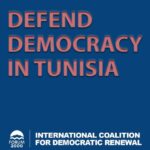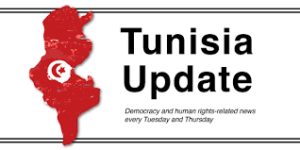A U.S. Congressional delegation has reaffirmed a pledge to support democracy in Tunisia, while expressing concern over the government’s authoritarian drift, the Washington-based Arab Center reports.
Senators Chris Coons (D-Delaware) and Rob Portman (R-Ohio), along with Representatives David Price (D-North Carolina) and Chrissy Houlahan (D-Pennsylvania) participated in a congressional delegation to Tunisia, meeting with civil society leaders and with President Kais Saied. The delegation reaffirmed its partnership with Tunisia, but also discussed democratic challenges facing the country, which receives $2 billion annually in US aid.

UGTT
Since July 2021, Tunisia’s trajectory has taken an increasingly worrisome reversal, as Saied suspended parliament, claimed all executive power, prohibited public gatherings, arrested political opponents, and imposed travel bans, the Cato Institute adds. As Cato senior fellow Doug Bandow recently observed on a visit to Tunisia (above), this authoritarian turn risks the freedoms Tunisians have been enjoying in the past 10 years and can throw the county back to arbitrary rule by a strongman.
The U.S. should oppose the impending $4 billion IMF loan to Tunisia until that country gets back on a path toward democracy, argues Council on Foreign Relations expert Elliott Abrams, a board member of the National Endowment for Democracy (NED):
Saied badly needs the loan, so the United States should use it to bargain for political concessions. As the head of the IMF’s recent mission in Tunisia said, “Broad buy-in will be essential” for any IMF-supported economic program to work—buy in Saied does not have. To take the most potent example, the powerful UGTT labor confederation said in June that “We reject the conditions set by the IMF. . . . We support reforms, but we don’t share the vision of reforms supported by this government.”

ICDR Statement on the recent anti-democratic actions in Tunisia
A decade after the dramatic events of late 2010 and early 2011, the underlying socio-political problems that led to the uprising against the autocratic Ben Ali regime remain largely unaddressed, argues analyst Fethi Mansouri. These relate essentially to the economic and social problems that continue to afflict marginalized communities. Ongoing social and regional inequalities, together with entrenched corruption, frustrate the realization of a more equitable and inclusive society, he writes for the Australian Institute of International Affairs:
President Saied exploited the mood of grievance and disappointment with the failure of democracy to bring about tangible change to justify his 2021 power grab. The political instability and the lack of progress on socio-economic reforms reached a crescendo in the middle of 2021…. What has served Tunisia very well during the initial stages of the revolution when compared to other Arab Spring countries ‒ broad political consensus among the various political parties, a vibrant civil society including a very robust and influential trade movement, and an apolitical army ‒ will now become the main, and perhaps only, source of hope for a new national dialogue that will restore the early democratic gains. RTWT

Credit: POMED
President Saïed ratified Tunisia’s new constitution, pledged to establish a Constitutional Court and issue a new electoral law for December’s parliamentary elections, NED partner POMED reports in its latest Tunisia Update.
A recent Arab Center webinar (below) discussed the future of democracy and governance in Tunisia, the status of the country’s political crisis, and recommendations for US policy.
Speakers: Monica Marks, Professor of Middle East Politics, New York University Abu Dhabi; Radwan Masmoudi, President, Center for the Study of Islam and Democracy; Jacob Walles; Nonresident Senior Fellow, Middle East Program, Carnegie Endowment for International Peace, and former US Ambassador to Tunisia; Daniel Brumberg – Moderator: Non-resident Senior Fellow, Arab Center Washington DC; Director of Democracy and Governance Studies, Georgetown University.







